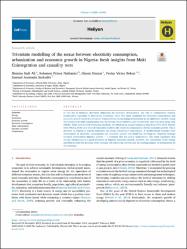| dc.contributor.author | Ali, Hamisu Sadi | |
| dc.contributor.author | Nathaniel, Solomon Prince | |
| dc.contributor.author | Uzuner, Gizem | |
| dc.contributor.author | Bekun, Festus Victor | |
| dc.contributor.author | Sarkodie, Samuel Asumadu | |
| dc.date.accessioned | 2020-05-24T01:42:20Z | |
| dc.date.available | 2020-05-24T01:42:20Z | |
| dc.date.issued | 2020 | en_US |
| dc.identifier.issn | 2405-8440 | |
| dc.identifier.uri | https://hdl.handle.net/11363/2159 | |
| dc.description | Document Information
Language:English
Accession Number: WOS:000518367800103
PubMed ID: 32123762 | en_US |
| dc.description.abstract | In this era of intensive electricity utilization for economic development, the role of urbanization remains inconclusive, especially in developing economies. Here, this study examined the electricity consumption and economic growth nexus in a trivariate framework by incorporating urbanization as an additional variable. Using the recent novel Maki cointegration test, Ng-Perron, Zivot-Andrews, and Kwiatkowski unit root tests along with FMOLS, DOLS and the CCR estimation methods, we relied on an annual frequency data from 1971-2014. Results from FMOLS, DOLS and the CCR regression confirms the electricity consumption-driven economic growth. This is desirable as Nigeria is heavily dependent on energy (electricity) consumption. A unidirectional causality from urbanization to electricity consumption and economic growth was found but the long-run empirical findings revealed urbanization impedes growth-a situation that has policy implications. The study highlights that though urbanization is a good predictor of Nigeria's economic growth, however, the adjustment of the energy portfolio to meet the growing urban demand will curtail the adverse and far-reaching impact of urbanization on the economy. | en_US |
| dc.description.sponsorship | SA Sarkodie acknowledges the financial support of Nord University Business School, Bodo, Norway. | en_US |
| dc.language.iso | eng | en_US |
| dc.publisher | ELSEVIER SCI LTD, THE BOULEVARD, LANGFORD LANE, KIDLINGTON, OXFORD OX5 1GB, OXON, ENGLAND | en_US |
| dc.relation.isversionof | 10.1016/j.heliyon.2020.e03400 | en_US |
| dc.rights | info:eu-repo/semantics/openAccess | en_US |
| dc.rights | Attribution-NonCommercial-NoDerivs 3.0 United States | * |
| dc.rights.uri | http://creativecommons.org/licenses/by-nc-nd/3.0/us/ | * |
| dc.subject | Energy | en_US |
| dc.subject | Economics | en_US |
| dc.subject | Economic growth | en_US |
| dc.subject | Electricity consumption | en_US |
| dc.subject | Maki cointegration | en_US |
| dc.subject | Dynamic causality | en_US |
| dc.subject | Urbanization | en_US |
| dc.subject | CARBON-DIOXIDE EMISSIONS | en_US |
| dc.subject | ENERGY-CONSUMPTION | en_US |
| dc.subject | GRANGER CAUSALITY | en_US |
| dc.subject | CO2 EMISSIONS | en_US |
| dc.subject | FINANCIAL DEVELOPMENT | en_US |
| dc.subject | TIME-SERIES | en_US |
| dc.subject | UNIT-ROOT | en_US |
| dc.subject | LONG-RUN | en_US |
| dc.subject | PANEL | en_US |
| dc.subject | COUNTRIES | en_US |
| dc.title | Trivariate modelling of the nexus between electricity consumption, urbanization and economic growth in Nigeria: fresh insights from Maki Cointegration and causality tests | en_US |
| dc.type | article | en_US |
| dc.relation.ispartof | HELIYON | en_US |
| dc.department | İktisadi İdari ve Sosyal Bilimler Fakültesi | en_US |
| dc.authorid | https://orcid.org/0000-0001-5035-5983 | en_US |
| dc.identifier.volume | 6 | en_US |
| dc.identifier.issue | 2 | en_US |
| dc.relation.publicationcategory | Makale - Uluslararası Hakemli Dergi - Kurum Öğretim Elemanı | en_US |



















